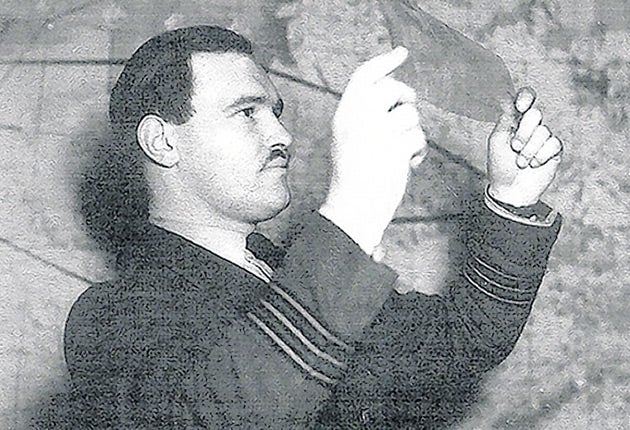Ernest Millington: Socialist MP who won the Distinguished Flying Cross

Ernest Millington, who died aged 93 on 9 May, was the last surviving Member of the 1935-45 House of Commons, which originally had a Conservative majority of 247. Probably its most untypical member, he was elected at a by-election in the previously safe Conservative constituency of Chelmsford on 26 April, 1945. A candidate of the left-wing Commonwealth Party, formed by Sir Richard Acland, he ignored the wartime electoral truce between the main political parties and, at 29 years of age, became the youngest MP at the time.
One of the sons of Edward Millington, a professional soldier and subsequently a printing worker, and his wife, Emily, Ernest Millington attended Chigwell Grammar school in Essex, a minor public school. Here he learnt Latin, Greek and French and read Plato and Voltaire which, together with his religious studies, gave him a left-wing outlook. This led him to join the Labour League of Youth, where he learnt to speak in public alongside another left-wing activist, Ted Willis, later the author of Dixon of Dock Green, etc. However, his political views offended his father and, at 16 years of age, he was thrown out of the family home. This forced him to leave school and seek employment to support himself. After re-establishing himself, despite losing a job because of his politics, he married Gwen Pickard and joined the Territorial Army to be ready to combat Fascism.
He was called up in 1939, sent for officer training and became a 2nd Lieutenant in the Royal Artillery. However, he volunteered to transfer to the RAF, trained as a pilot and joined Bomber Command, being assigned to fly Lancaster bombers. Of 125,000 members of Bomber Command aircrews during the Second World War, 60 per cent became casualties – most fatal – and only skill and good luck enabled him to survive. On one occasion, when his plane was hit and an engine caught fire, he put it into a steep dive which blew out the flames. On another occasion, two engines and the compass were knocked out in combat and he limped back, following another plane, miraculously managing to land his crippled aircraft with a punctured tyre.
At a conference of senior officers, he dared to speak out in criticism of proposals that attacking planes should fly in formation. Instead of being downgraded as an upstart, he was promoted within a month to the rank of Wing Commander.
When he was unexpectedly elected to the House of Commons, he was soon speaking out again. However, he was not universally popular and neighbours in his constituency, who accepted him as a Wing Commander, later cut him as a left-wing MP.
In the House of Commons, having sewn the Distinguished Flying Cross, which he had just been awarded, on to his uniform, he was approached by a Tory MP who had been a military police officer in the RAF with the rank of Squadron Leader, and informed that he was incorrectly dressed as his DFC ribbon was too wide.
"If you are talking to me as an RAF officer," Millington replied, "stand to attention, take your hand out of your trouser pocket and address a senior officer as 'sir'. If you are talking as a fellow Member of Parliament, mind your own business and bugger off." The Tory MP took the second option.
Millington admired John Strachey and Aneurin Bevan and made many friends in the House of Commons, to which he was re-elected in the 1945 General Election. As the sole representative of the Commonwealth Party, however, he was frustrated by the fact that there were no other party members to support him on any initiatives he wished to take. He generally supported the policies of the Labour Government and rejoined the Labour Party in 1948. He did not, however, enjoy being an MP with the many constituency responsibilities, and the task of supporting his wife and four daughters on a meagre Parliamentary salary of never more than £1,000 a year.
After losing his seat in the 1950 General Election, he found it difficult to obtain suitable alternative employment and decided to go back in the RAF as a flight lieutenant. However, he clearly made enemies – for example, by making known his dissident views on the Suez expedition – and, in 1958, he was court-martialled and dismissed from the service on charges of misapplying the proceeds of dances totalling £25. 2s. 3d., which he denied. It looked like victimisation.
After somehow surviving, with his family dependent on him, Millington trained as a teacher and served very successfully in posts at Shoreditch Comprehensive School and the Newham Teachers' Centre. His marriage suffered, however, and he was divorced in 1974. He later married Ivy Robinson, a fellow teacher, with whom he eventually retired to Couze in the Dordogne, France.
In 2006 he published his autobiography, Was that really me? He retained his socialist views to the end, though very critical of New Labour. He is survived by his second wife, Ivy, four daughters, seven grandchildren and six great-grandchildren.
Stan Newens
Ernest Millington, bomber pilot, MP and teacher; born London 15 February, 1916; married 1937 Gwen Pickard (four daughters, marriage dissolved 1974); married 1983 Ivy Robinson; died Couze, France 9 May 2009.
Subscribe to Independent Premium to bookmark this article
Want to bookmark your favourite articles and stories to read or reference later? Start your Independent Premium subscription today.

Join our commenting forum
Join thought-provoking conversations, follow other Independent readers and see their replies